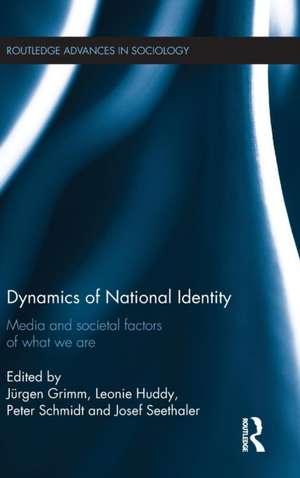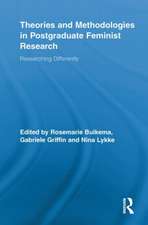Dynamics of National Identity: Media and Societal Factors of What We Are: Routledge Advances in Sociology
Editat de Jürgen Grimm, Leonie Huddy, Peter Schmidt, Josef Seethaleren Limba Engleză Hardback – 15 feb 2016
| Toate formatele și edițiile | Preț | Express |
|---|---|---|
| Paperback (1) | 327.36 lei 3-5 săpt. | +25.81 lei 6-12 zile |
| Taylor & Francis – 12 dec 2019 | 327.36 lei 3-5 săpt. | +25.81 lei 6-12 zile |
| Hardback (1) | 1117.07 lei 6-8 săpt. | |
| Taylor & Francis – 15 feb 2016 | 1117.07 lei 6-8 săpt. |
Din seria Routledge Advances in Sociology
-
 Preț: 309.12 lei
Preț: 309.12 lei - 20%
 Preț: 296.88 lei
Preț: 296.88 lei -
 Preț: 326.63 lei
Preț: 326.63 lei -
 Preț: 310.81 lei
Preț: 310.81 lei -
 Preț: 334.09 lei
Preț: 334.09 lei -
 Preț: 311.41 lei
Preț: 311.41 lei -
 Preț: 309.46 lei
Preț: 309.46 lei - 9%
 Preț: 865.99 lei
Preț: 865.99 lei -
 Preț: 326.40 lei
Preț: 326.40 lei -
 Preț: 311.41 lei
Preț: 311.41 lei -
 Preț: 301.51 lei
Preț: 301.51 lei -
 Preț: 288.87 lei
Preț: 288.87 lei -
 Preț: 152.30 lei
Preț: 152.30 lei -
 Preț: 317.48 lei
Preț: 317.48 lei -
 Preț: 204.46 lei
Preț: 204.46 lei -
 Preț: 310.60 lei
Preț: 310.60 lei -
 Preț: 303.43 lei
Preț: 303.43 lei -
 Preț: 310.29 lei
Preț: 310.29 lei -
 Preț: 385.11 lei
Preț: 385.11 lei -
 Preț: 318.95 lei
Preț: 318.95 lei -
 Preț: 312.86 lei
Preț: 312.86 lei -
 Preț: 283.77 lei
Preț: 283.77 lei -
 Preț: 160.59 lei
Preț: 160.59 lei -
 Preț: 334.09 lei
Preț: 334.09 lei - 8%
 Preț: 388.98 lei
Preț: 388.98 lei -
 Preț: 386.78 lei
Preț: 386.78 lei - 8%
 Preț: 388.92 lei
Preț: 388.92 lei -
 Preț: 309.99 lei
Preț: 309.99 lei -
 Preț: 152.39 lei
Preț: 152.39 lei -
 Preț: 327.36 lei
Preț: 327.36 lei -
 Preț: 295.10 lei
Preț: 295.10 lei - 8%
 Preț: 383.57 lei
Preț: 383.57 lei - 18%
 Preț: 1111.55 lei
Preț: 1111.55 lei -
 Preț: 445.38 lei
Preț: 445.38 lei - 18%
 Preț: 701.88 lei
Preț: 701.88 lei - 18%
 Preț: 1053.92 lei
Preț: 1053.92 lei - 18%
 Preț: 1002.36 lei
Preț: 1002.36 lei - 18%
 Preț: 1057.89 lei
Preț: 1057.89 lei - 20%
 Preț: 248.31 lei
Preț: 248.31 lei - 18%
 Preț: 1003.30 lei
Preț: 1003.30 lei - 18%
 Preț: 1109.21 lei
Preț: 1109.21 lei - 18%
 Preț: 998.56 lei
Preț: 998.56 lei - 18%
 Preț: 1061.22 lei
Preț: 1061.22 lei - 18%
 Preț: 1058.06 lei
Preț: 1058.06 lei - 18%
 Preț: 1002.36 lei
Preț: 1002.36 lei - 18%
 Preț: 1113.12 lei
Preț: 1113.12 lei - 15%
 Preț: 425.26 lei
Preț: 425.26 lei
Preț: 1117.07 lei
Preț vechi: 1362.29 lei
-18% Nou
Puncte Express: 1676
Preț estimativ în valută:
213.75€ • 233.12$ • 180.24£
213.75€ • 233.12$ • 180.24£
Carte tipărită la comandă
Livrare economică 24 aprilie-08 mai
Preluare comenzi: 021 569.72.76
Specificații
ISBN-13: 9781138816428
ISBN-10: 1138816426
Pagini: 382
Ilustrații: 33 black & white illustrations, 79 black & white tables, 33 black & white line drawings
Dimensiuni: 156 x 234 x 25 mm
Greutate: 0.68 kg
Ediția:1
Editura: Taylor & Francis
Colecția Routledge
Seria Routledge Advances in Sociology
Locul publicării:Oxford, United Kingdom
ISBN-10: 1138816426
Pagini: 382
Ilustrații: 33 black & white illustrations, 79 black & white tables, 33 black & white line drawings
Dimensiuni: 156 x 234 x 25 mm
Greutate: 0.68 kg
Ediția:1
Editura: Taylor & Francis
Colecția Routledge
Seria Routledge Advances in Sociology
Locul publicării:Oxford, United Kingdom
Public țintă
Postgraduate and UndergraduateCuprins
1. Introduction, (Jürgen Grimm, Leonie Huddy, Peter Schmidt and Josef Seethaler)
Part I: Conceptualizing National Identity
2. Unifying National Identity Research: Interdisciplinary perspectives, (Leonie Huddie)
3. Identification with Groups and National Identity: Applying Multidimensional Models of Group Identification to National Identification, (Sonja Roccas and Avihay Berlin)
4. Dimensional Differences between Nationalism and Patriotism, (Horst-Alfred Heinrich)
5. National Identity and Exclusion of Non-ethnic Migrants: Germany and Israel in Comparative Perspective, (Oshrat Hochman, Rebeca Raijman and Peter Schmidt)
6. Grounded and Normative Dimensions of National Pride in Comparative Perspective, (Marharyta Fabrykant and Vladimir Magun)
Part II: National Identity, Multi-Cultural Societies, and Supra-National Integration
7. Exit, Voice, and the Impact of Regional, National, and European Identification: An Integration and Empirical Test of Albert Hirschman’s Theory and the Theory of Collective Action, (Karl-Dieter Opp)
8. Perceived Discrimination, Modes of Collective Belonging and Self-Esteem Among Descendants of Immigrants in Austria and Germany, (Rossalina Latcheva and Barbara Herzog-Punzenberger)
9. Social-Cultural Milieus And National Identification Of Second Generation Migrant Youth in Austria, (Hildegard Weiss)
10. Critical Views of the Nation, National Attachment, and Attitudes toward Immigrants in Switzerland, (Oriane Sarrasin, Eva G. T. Green and Nicole Fasel)
11. National Identity and Ant-Immigrant Attitudes: The case of Russia, (Lusine K. Grigoryan)
12. European Identity as a Safeguard against Xenophobia? A Differentiated View Based on Identity Content, (Georg Datler)
13. National and European Identity – A Comparison Between Elites and Populations, (Bettina West)
Part III: Media and National Identity
14. Historical Communication and Its Influence on National and Ethnic Identity in Russia, (Christiane Grill)
15. Geopolitical Identity 2.0: The Significance of Regional, National, and Transnational Roots on Social Networking Sites, (Bernadette Kneidinger)
16. National Identity Building as a Mediated Process: A Two-Level Model of its Functions and Dysfunctions, (Philipp Müller)
17. The French EU Referendum Discourse in 2005: How is mediated discourse linked to voting intentions, voting behavior, and support?, (Claudia Wiesner)
Part I: Conceptualizing National Identity
2. Unifying National Identity Research: Interdisciplinary perspectives, (Leonie Huddie)
3. Identification with Groups and National Identity: Applying Multidimensional Models of Group Identification to National Identification, (Sonja Roccas and Avihay Berlin)
4. Dimensional Differences between Nationalism and Patriotism, (Horst-Alfred Heinrich)
5. National Identity and Exclusion of Non-ethnic Migrants: Germany and Israel in Comparative Perspective, (Oshrat Hochman, Rebeca Raijman and Peter Schmidt)
6. Grounded and Normative Dimensions of National Pride in Comparative Perspective, (Marharyta Fabrykant and Vladimir Magun)
Part II: National Identity, Multi-Cultural Societies, and Supra-National Integration
7. Exit, Voice, and the Impact of Regional, National, and European Identification: An Integration and Empirical Test of Albert Hirschman’s Theory and the Theory of Collective Action, (Karl-Dieter Opp)
8. Perceived Discrimination, Modes of Collective Belonging and Self-Esteem Among Descendants of Immigrants in Austria and Germany, (Rossalina Latcheva and Barbara Herzog-Punzenberger)
9. Social-Cultural Milieus And National Identification Of Second Generation Migrant Youth in Austria, (Hildegard Weiss)
10. Critical Views of the Nation, National Attachment, and Attitudes toward Immigrants in Switzerland, (Oriane Sarrasin, Eva G. T. Green and Nicole Fasel)
11. National Identity and Ant-Immigrant Attitudes: The case of Russia, (Lusine K. Grigoryan)
12. European Identity as a Safeguard against Xenophobia? A Differentiated View Based on Identity Content, (Georg Datler)
13. National and European Identity – A Comparison Between Elites and Populations, (Bettina West)
Part III: Media and National Identity
14. Historical Communication and Its Influence on National and Ethnic Identity in Russia, (Christiane Grill)
15. Geopolitical Identity 2.0: The Significance of Regional, National, and Transnational Roots on Social Networking Sites, (Bernadette Kneidinger)
16. National Identity Building as a Mediated Process: A Two-Level Model of its Functions and Dysfunctions, (Philipp Müller)
17. The French EU Referendum Discourse in 2005: How is mediated discourse linked to voting intentions, voting behavior, and support?, (Claudia Wiesner)
Notă biografică
Jürgen Grimm is Professor of Communication Studies at the University of Vienna.
Leonie Huddy is Professor at the Department of Political Science at Stony Brook University, New York.
Peter Schmidt is Professor emeritus at the Department of Political Science, University of Giessen, and State Research University Higher School of Economics (HSE), Moscow.
Josef Seethaler is Deputy Director of the Institute for Comparative Media and Communication Studies at the Austrian Academy of Sciences and the University of Klagenfurt.
Leonie Huddy is Professor at the Department of Political Science at Stony Brook University, New York.
Peter Schmidt is Professor emeritus at the Department of Political Science, University of Giessen, and State Research University Higher School of Economics (HSE), Moscow.
Josef Seethaler is Deputy Director of the Institute for Comparative Media and Communication Studies at the Austrian Academy of Sciences and the University of Klagenfurt.
Descriere
Globalization, immigration and economic crisis challenge the conceptions of nations, trans-national institutions and post-ethnic societies which are central topics in social sciences' discourses. This book examines in an interdisciplinary and international comparative way structures of national identity which are in conflict with or supporting multi-ethnic diversity and trans-national connectivity.















